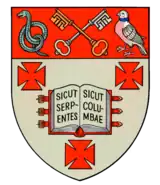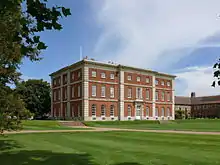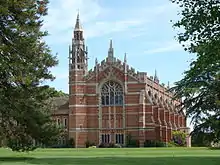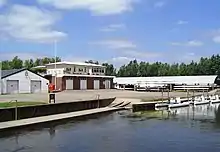Radley College
Radley College, formally St Peter's College, Radley or even the College of St. Peter at Radley,[1][2] is a public school (independent boarding school for boys) near Radley, Oxfordshire, England, which was founded in 1847.[3][4] The school covers 800 acres (320 hectares) including playing fields, a golf course, a lake, and farmland. Before the counties of England were re-organised, the school was in Berkshire.
| Radley College | |
|---|---|
 | |
| Address | |
Kennington Road , , OX14 2HR England | |
| Information | |
| Type | Public school Private boarding school |
| Motto | Latin: Sicut serpentes, sicut columbae ([wise] as serpents, [innocent] as doves [Matthew 10:16]) |
| Religious affiliation(s) | Church of England |
| Established | 1847 |
| Founder | William Sewell |
| Department for Education URN | 123300 Tables |
| Chairman of the Council | David Smellie |
| Warden | John Moule |
| Gender | Boys |
| Age | 13 to 18 |
| Enrolment | c. 750 |
| Houses | 11 |
| Colour(s) | Red and white |
| Publication | The Radley College Chronicle |
| Yearbook | The Radleian |
| Former pupils | Old Radleians (ORs) |
| Website | www |
Radley is one of only three public schools to have retained the boys-only, boarding-only tradition, the others being Harrow and Eton. Formerly this group included Winchester, although the latter school is currently undergoing a transition to co-ed status.[5] Of the seven public schools addressed by the Public Schools Act 1868 four have since become co-educational: Rugby (1976), Charterhouse (1971), Westminster (1973), and Shrewsbury (2014). For the academic year 2022/23, Radley charged boarders up to £14,850 per term, or £44,550 per annum.[6] It is a member of the Rugby Group.
History

Radley was founded in 1847 by William Sewell (1804–79) and Robert Corbet Singleton (1810–81). The first pupil was Samuel Reynolds, who in 1897 wrote his reminiscences of school life.
The school was originally housed in Radley Hall, now known as "Mansion". Radley Hall was built in the 1720s for the Stonehouse family. Later in the 18th century the estate passed to the Bowyer family, who commissioned Capability Brown to re-design the grounds. After the school was founded, extensive building work took place, beginning with Chapel (replaced by the current building in 1895), F Social and Octagon (the earliest living accommodation for the boys), Clock Tower, and in 1910 the dining hall (Hall). Building work has continued throughout the 20th and 21st centuries, with three new Socials, a weights-room/gym, a rowing tank, a theatre, and a real tennis court being completed since 2006. The Science Block was also expanded and refurbished in 2019. The grounds include a lake, a golf course and woodland.
On 31 August 2017, The Daily Telegraph[7] reported that a whistleblower had suggested that teachers had helped their students in an art GCSE exam. Investigations by the exam board found no fault beyond a minor technical breach of exam regulations. Radley College issued a statement expressing full support for staff and procedures both within the art department and across the school.
On 6 July 2018, a plane trailing a banner reading "Make Radley Great Again" was flown over the school, in protest against Warden John Moule's campaign of modernisation. The £750 cost of the plane hire was raised by pupils at the school.[8]
Price-fixing cartel case (2005)
In 2005 Radley College was one of fifty of the country's leading independent schools which were found guilty by the Office of Fair Trading of running an illegal price-fixing cartel which had allowed them to drive up fees.[9] Each school was required to pay a nominal penalty of £21,360 and all agreed to make ex-gratia payments totalling three million pounds into a Trust designed to benefit pupils who attended the schools during the period in respect of which fee information was shared.[10] In their defence, Jean Scott, the head of the Independent Schools Council, said that independent schools had previously been exempt from the anti-cartel rules applied to business; they were following a long-established procedure in sharing the information with one another and they were unaware of the current law.[11]
School terms
There are three academic terms in the year:
- The Michaelmas term, from early September to mid-December.
- The Lent term, from early January to late March.
- The Summer term, from mid-April to late June or early July.
Radley formalities
Like Winchester, with its Notions, Radley has its own specialised terminology and formalities.[12] For example, all teachers are referred to as "dons", and female teachers and members of staff are addressed only as "ma'am"; the headmaster is known as the "warden"; boarding houses are known as "socials", with their masters being known as "tutors" and their head prefects as "pups"; ties earned by pups, top sportsmen, and other distinguished boys have flat bottoms and are known as "strings" ("social strings" if earned for distinction within the social, "college strings" if earned for distinction within the wider college); and the five year-groups, from first to last, are called "shell", "remove", "fifth", "6.1", and "6.2". During the Michaelmas and Lent terms, gowns are worn over uniforms, while during the summer term, shirts are worn without ties, jackets, or gowns (known as "Summer Dress" or, more officially, as "Shirt-Sleeve Order"). A formal house meeting is held once a week, known as "social prayers" (an assembly usually with a talk or presentation); an informal house meeting with food, known as "cocoa", takes place every evening; a weekend which a boy would usually stay in school for but has been allowed to leave on is known as a "privi" (short for "privilege weekend" as these can be cancelled if a boy is subject to disciplinary proceedings); and the final day of the academic year is known as "gaudy", from the Latin gaudē meaning 'rejoice thou!'
Socials
There are 11 socials at Radley, each housing approximately 70 boys and distinguished by the colours of their members' ties. They are each known by a single letter, although they are formally named after their tutor (e.g., H, formally May's Social). When the college opened, most boys were living together in College, but they were under the care of six "social tutors" and the term "social" then referred to all the boys under the care of one tutor. When D Social was built in 1886 all the boys and their tutor were united in their own living quarters and so the word "social" came to mean the building and all of its inhabitants.[13] Similar to Eton's houses and their dames, each social at Radley has a matron known as the "PHM" ("pastoral housemistress"), whose role is central.[14]
| Name | Colours | Tutor |
|---|---|---|
| A | Blue and brown | REP Hughes |
| B | Purple and black | CE Scott Malden |
| C | Pale blue and dark blue | SR Giddens |
| D | Blue and white | H Crump |
| E | Pink and black | TC Lawson |
| F | Red and gold | TCH Norton |
| G | Red and dark blue | GR King |
| H | Dark green and light yellow | GHS May |
| J | Light blue and coral | KMW Stovold |
| K | Green and white | MG Glendon-Doyle |
| L | Gold and navy blue | AMH Hakimi |
Academic aspects

The school was inspected by the independent schools' Inspectorate in February 2008. The inspection report rated the school's standard of education as "outstanding", the highest rating.[15] There was a subsequent inspection by ISI in 2013.[16]
In 2012, the Independent review of A level results, based on government issued statistics, ranked Radley 31st in the UK, ahead of Malvern (32nd), Harrow (34th), Winchester (73rd), Tonbridge (74th), Eton (80th) and Wellington (89th)[17] By 2019 they were still in the top 100 but had dropped to 75th place.[18]
Sports

Sports played at the College are rugby football in the Michaelmas Term, hockey, rowing and football in the Lent Term and cricket, rowing, lawn tennis, and athletics in the Summer Term.
Other sports played include badminton, basketball, beagling, cross-country, fencing, fives, lacrosse, rackets, real tennis, rugby sevens, squash and water polo.[19]
Rugby
Rugby is the major sport of the Michaelmas term. The school fields 23 rugby teams on most Saturdays of the Michaelmas term and on some Thursdays. The Master in charge of Rugby is Gloucester loose-head prop Nick Wood, OR.
Rowing
Radley is recognised for its rowing, having won events at Henley Royal Regatta on 6 occasions.[20] Only Eton, St Paul's, Shrewsbury, and St Edward's have won more events at the Regatta.
Cricket
Cricket is played in the summer term. Some Old Radleians have progressed to play cricket for England or captain county level cricket teams. The cricket grounds (including Smithson Fields) have been described as 'arguably one of the best in the country'[21] while the sporting facilities have been described as world-class.[22]
Field hockey
Eighteen hockey teams are fielded during the Lent term. Teams train on three Astroturf pitches and a full-sized indoor hockey pitch. Radley takes part in the Independent Schools Hockey League.[23]
Football
Twelve football teams are fielded in the Lent term. Radley competes in ISFA Southern Independent Schools Lent Term League. There is a yearly pre-season training camp before term starts.[24]
Other sports
Sports such as fives, rackets, sailing, badminton, and polo are represented, as well as scuba diving. A real tennis court opened in July 2008, which made Radley the only school in the world to have fives, squash, badminton, tennis, racquets, and real tennis courts all on campus.[25]
Southern Railway Schools Class
The school lent its name to the thirty-first steam locomotive (Engine 930) in the Southern Railway's Class V of which there were 40.[26] This Class was also known as the Schools Class because all 40 of the class were named after prominent English public schools. "Radley", as it was called, was built in 1934 and was withdrawn in 1962. A nameplate from 930, Radley, is now displayed in the stationery department of Shop (the College's shop).
List of Wardens
- R C Singleton (founder) (1847–1851)
- W B Heathcote (1851–1852)
- W M Sewell (founder) (1852–1861)
- R W Norman (1861–1866)
- W Wood (1866–1870)[27]
- C Martin (1871–1879)
- R J Wilson (1880–1888)
- H Lewis Thompson (1888–1896)
- T Field (1897–1913)
- E Gordon Selwyn (1913–1919)
- A Fox (1919–1925)
- W H Ferguson (1925–1937)
- J C Vaughan Wilkes (1937–1954)
- W M M Milligan (1954–1968)
- D R W Silk (1968–1991)
- R M Morgan (1991–2000)
- A W McPhail (2000–2014)
- J S Moule (2014–)
Old Radleians
- Boyd Alexander, the African traveller and ornithologist
- James Bachman, comic writer and actor
- Merton Barker, cricketer and field hockey player
- Richard Beard, prizewinning author of fiction and non-fiction
- Harry Bicket, conductor
- C. E. Bowden, pilot and pioneer of IC engined model flight and radio control
- Gerald Brenan, writer
- William Burdett-Coutts, producer, Assembly Festival[28]
- James Burton, conductor and composer
- Richard Toby Coke, UKIP politician[29]
- Collingwood Tinling, builder of first jet engine
- William Collins, author and cricketer
- Peter Cook, comedian
- John Crabtree, lawyer and businessman; Lord Lieutenant of the West Midlands[30]
- Tim Crooks, Olympic rower
- Jamie Dalrymple, cricketer
- Norman Denny, author, translator of Victor Hugo's Les Misérables
- Ted Dexter, cricketer
- Alexander Downer, former Australian Foreign Minister and former Australian High Commissioner to the Court of St James
- Mark Durden-Smith, television presenter
- Marc Edwards, sports correspondent with BBC World News (formerly with CCTV International, France 24 and Eurosport)
- Ivan Ewart, British naval officer and charity worker
- Jeremy Flint, bridge player
- George Freeman, Conservative Member of Parliament for Mid Norfolk
- David Freeman-Mitford, 2nd Baron Redesdale, father of the Mitford sisters
- Andrew Gant, choirmaster and composer
- Richard Gibson, actor, best known as Herr Flick in the BBC series 'Allo 'Allo!
- Nicholas Hannen, actor
- Robert Hall, BBC Special Correspondent
- Noel Harrison, English actor & member of the British Olympic skiing team in the 1950s
- Simon Hart, Conservative Member of Parliament for Carmarthen West and South Pembrokeshire.
- Alex Hearne, cricketer
- Christopher Hibbert, historian
- Cyril Holland, son of Oscar Wilde
- Sir George Hollingbery, former Conservative Member of Parliament for Meon Valley and Her Majesty's Ambassador-designate to the Republic of Cuba
- Charles Howard, 20th Earl of Suffolk, pioneering bomb disposal expert in the Second World War
- Alan Huggins, Hong Kong judge
- Charles Hulse, cricketer
- Ben Hutton, cricketer
- Jamie Laing, Reality TV in Made in Chelsea
- Thomas Langford-Sainsbury, air vice marshal
- Hugh Lindley-Jones, cricketer
- Desmond Llewelyn, actor best known for playing Q in many James Bond films
- Archie Lorne, heir-apparent to the Dukedom of Argyll
- James Lovegrove, SF novelist
- Dick Lucas, evangelical Anglican preacher
- Sir Edgar Ludlow-Hewitt, air chief marshal
- James Charles Macnab of Macnab, soldier and chief of Clan Macnab[31]
- Sir George Mallaby, public servant, High Commissioner to New Zealand
- Robert Marshall, cricketer
- Sir Charlie Mayfield, CEO of Waitrose and John Lewis Partnership
- J.X. Merriman, South African statesman
- Harold Monro, founder of the Poetry Bookshop
- Lord Charles Montagu Douglas Scott, admiral
- Andrew Motion, poet and former Poet Laureate
- Andrew Nairne, director of Kettle's Yard
- Sandy Nairne, director of the National Portrait Gallery
- Sir Christopher Nugee, Lord Justice of the Court of Appeal (England and Wales)
- Edward Nugee, Barrister, Treasurer of the Inner Temple
- Lt Gen Richard Nugee, British Army officer
- Owen Paterson, MP and former cabinet minister
- Ian Payne, broadcaster
- James Pearce, journalist and presenter for BBC Sport
- Edgar Prestage, historian and Portuguese scholar
- Dennis Price, actor
- Michael Reeves, film director
- S.H. Reynolds, clergyman
- Professor Sir Mike Richards, UK National Cancer Director
- Lord Scarman, judge
- Brough Scott, horse racing journalist, radio and television presenter, and former jockey
- James Scott, cricketer
- Tom Shakespeare, sociologist and broadcaster
- Thomas Spyers, cricketer
- Clive Stafford Smith, campaigning lawyer
- Andrew Strauss, cricketer
- Will Stuart, rugby player
- Jeremy Stuart-Smith, High Court judge
- Sir Reginald Stubbs, colonial governor
- Lieutenant Colonel Rupert Thorneloe, killed in action in Afghanistan on 1 July 2009
- Nigel Twiston-Davies, Cheltenham Gold Cup winning horse trainer
- Charlie Wallis, cricketer
- Peter Wildeblood, journalist and playwright and celebrated gay rights campaigner
- Richard Wilson, Baron Wilson of Dinton, former UK Cabinet Secretary
- Simon Wolfson, Baron Wolfson of Aspley Guise, CEO of Next plc
- Major General Sir Edward Woodgate, who died of wounds sustained during the Battle of Spion Kop
- Charles Worsley, cricketer[32]
References
- "About the register of charities". register-of-charities.charitycommission.gov.uk. Retrieved 21 March 2021.
- "The College Crest and Motto". www.radley.org.uk. Retrieved 27 April 2023.
- "Joyce Huddleston – freelance technical writer, editor and abstractor". Archived from the original on 13 May 2018. Retrieved 2 May 2010.
- "Radley College". Radley Village. Archived from the original on 8 March 2005. Retrieved 16 April 2010.
- "Winchester College in the 21st Century". Winchester College. Retrieved 9 February 2021.
- "Cheating in Exam". The Daily Telegraph. London. 31 August 2017.
- "Radley College revolt over modernising headteacher who has changed 100-year-old crest". The Daily Telegraph. London. 14 July 2018. Retrieved 15 July 2018.
- "Private schools fee-fixing ruling". London: BBC News. 9 November 2005.
- "OFT names further trustees as part of the independent schools settlement". The Office of Fair Trading. Archived from the original on 10 June 2008. Retrieved 16 April 2010.
- "Private schools send papers to fee-fixing inquiry". The Daily Telegraph. London. 1 March 2004. Retrieved 15 March 2011.
- "A Radley Glossary". Radley College. Retrieved 20 August 2021.
- "The Socials". Radley College. Retrieved 26 August 2021.
- "A Radley Glossary". Radley College. Retrieved 26 August 2021.
- "ISI Inspection report 2008". Radley College. 21 February 2008. Archived from the original on 5 May 2010. Retrieved 16 April 2010.
- "Radley College :: Independent Schools Inspectorate". isi.net. Retrieved 20 April 2017.
- "The Top 100 Independent Schools at A-level". The Independent. 26 January 2012. Retrieved 31 May 2013.
- "Top 100 Independent Schools by A Levels and Pre U". Best Schools. Retrieved 21 March 2021.
- "StackPath". www.radley.org.uk. Retrieved 21 March 2021.
- "Results of Final Races – 1946–2003". Archived from the original on 16 July 2011. Retrieved 29 November 2018.
- SCHOOL SPORT: Search is on at Radley for next Strauss (From Oxford Mail)
- "'World class' facilities at Radley and Upton to boost area's Olympic boom (From Oxford Mail)". Oxfordmail.co.uk. 27 November 2009. Retrieved 16 April 2010.
- "StackPath". www.radley.org.uk. Retrieved 21 March 2021.
- "StackPath". www.radley.org.uk. Retrieved 21 March 2021.
- Smith, Russell (12 June 2006). "School Sport: Search is on at Radley for next Strauss". Oxford Mail. Retrieved 31 May 2013.
- "Southern E-Group". Retrieved 29 December 2012.
- "William Wood's Diary". Radley College Archive. Retrieved 25 June 2019.
- "William Burdett-Coutts". Rhodes University Trust. Archived from the original on 11 March 2012. Retrieved 19 August 2012.
- Charles Mosley, ed., Burke's Peerage, Baronetage & Knightage (107th edition, 2003), vol. 1, page 641; vol. 2, p. 2289
- "Crabtree, John Rawcliffe Airey, (born 5 Aug. 1949), Lord-Lieutenant of West Midlands, since 2017". Who's Who & Who Was Who. Retrieved 29 May 2022.
- 'Macnab of Macnab, James Charles' in Who's Who 2012 (London: A. & C. Black, 2011)
- "Player profile: Charles Worsley". CricketArchive. Retrieved 19 November 2011.
Further reading
- Hibbert, Christopher (1997). No Ordinary Place: Radley College and the Public School System 1847–1997. London: John Murray General Publishing Division. ISBN 0-7195-5176-5.
- "William Burdett-Coutts". Rhodes University Trust. Archived from the original on 11 March 2012. Retrieved 19 August 2012.